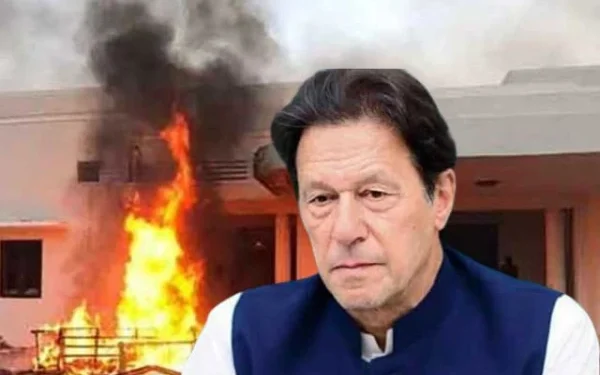Introduction: Key Legal Turning Point for Imran Khan
Lahore: In a crucial legal development, the Lahore High Court is set to hear the bail pleas of former Prime Minister and Pakistan Tehreek-e-Insaf (PTI) founder Imran Khan today. The bail applications are linked to eight cases stemming from the violent protests that took place on May 9, 2023, following Khan’s arrest. These cases involve charges of arson, vandalism, and encirclement of government and military properties, including the high-profile attack on Jinnah House.
Details of the Hearing
The bail pleas will be reviewed by a two-member bench of the Lahore High Court, headed by Justice Shahbaz Rizvi. The court has summoned the prosecution to present its arguments, as the legal team representing Imran Khan has already concluded their submissions in the previous hearing. The prosecution is expected to outline their case in detail, including the evidence they claim links Imran Khan to the orchestrated unrest.
Background: May 9 Protests and Their Aftermath
The May 9 protests erupted across Pakistan after the dramatic arrest of Imran Khan from the Islamabad High Court premises in connection with the Al-Qadir Trust case. What followed was a wave of violent demonstrations, particularly by PTI supporters, which led to extensive damage to state and military properties. Protesters attacked key buildings, including the Corps Commander House (Jinnah House) in Lahore, military installations, and government offices.
The federal and provincial governments responded with a sweeping crackdown on PTI leadership and activists, resulting in the arrest of thousands. Dozens of cases were filed against PTI leaders, including Imran Khan, under charges ranging from incitement to terrorism and criminal conspiracy to sedition and destruction of public property.
Legal Challenges Faced by Imran Khan
Imran Khan currently faces more than 150 legal cases, ranging from contempt of court and corruption to inciting violence and terrorism. The eight bail petitions under consideration today are considered critical, as they pertain to some of the most severe allegations linked to the May 9 riots. These include the:
- Attack on Jinnah House (Corps Commander House)
- Arson at government buildings
- Encirclement of military installations
- Destruction of public infrastructure
Arguments Presented by the Defense
Imran Khan’s legal team, led by prominent lawyers, has argued that the PTI founder was neither present at the protest sites nor did he issue any directive to incite violence. They maintain that the cases are politically motivated and aim to suppress dissent and dismantle PTI as a political force. The defense also emphasized that Khan was in the custody of law enforcement when most of the violent incidents occurred, making it implausible for him to orchestrate or encourage the attacks.
The court, in previous hearings, discussed these arguments at length and questioned whether circumstantial or direct evidence exists to prove Khan’s involvement in the protests.
Prosecution’s Expected Arguments
In today’s proceedings, the prosecution is expected to focus on the narrative that the May 9 violence was not spontaneous but a planned and coordinated attack on state institutions, with directives allegedly coming from PTI’s top leadership. They are likely to present video footage, social media content, and witness testimonies to substantiate their claims.
The government has maintained that the violent acts were tantamount to a rebellion against the state, and it has pledged to bring all culprits to justice under the anti-terrorism law.
Political Implications of the Case
The outcome of these bail pleas could have far-reaching implications for Pakistan’s political landscape. If bail is granted, it may reinvigorate PTI’s political momentum and provide Khan with a much-needed legal respite to re-engage with his party and supporters. However, if the bail is denied, it could further deepen the party’s leadership crisis and reinforce the perception of a government clampdown.
These cases are being closely watched both domestically and internationally, as they are seen as a test of Pakistan’s judicial independence and its ability to handle politically sensitive matters fairly.
Judicial Precedents and Constitutional Issues
Legal experts suggest that the High Court’s ruling will likely set judicial precedents on how protests and political dissent are treated under Pakistani law. There are also constitutional dimensions to the cases, including the right to peaceful assembly, freedom of expression, and the limits of anti-terror legislation when applied to political opposition.
Security Measures in Place
In anticipation of today’s hearing, strict security measures have been implemented in and around the Lahore High Court. Law enforcement agencies have been deployed to prevent any potential unrest, and access to the courtroom has been restricted to only essential personnel, legal teams, and accredited media.
Conclusion: A Day of Legal Reckoning
Today’s hearing at the Lahore High Court represents a pivotal moment for Imran Khan and the Pakistan Tehreek-e-Insaf. With both legal and political stakes running high, the court’s decision on the bail petitions could shape the trajectory of PTI’s future and influence the broader democratic environment in the country. As the nation awaits the verdict, attention remains firmly fixed on the legal proceedings, which could have a transformative impact on Pakistan’s justice system and political stability.

























